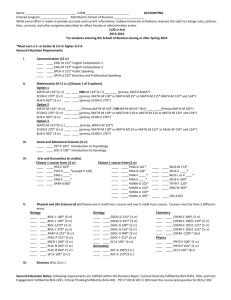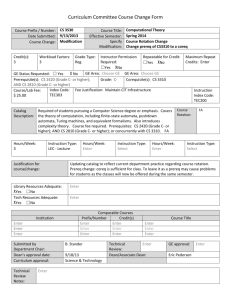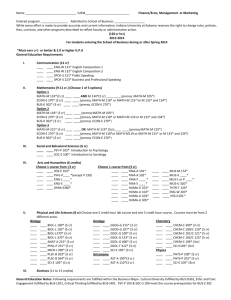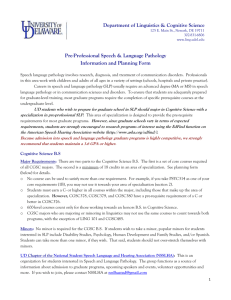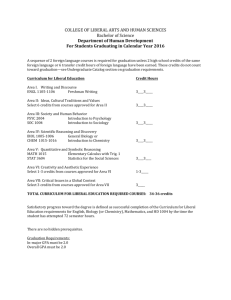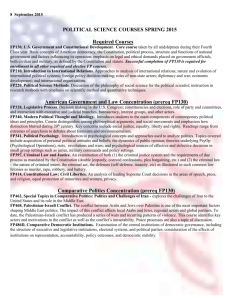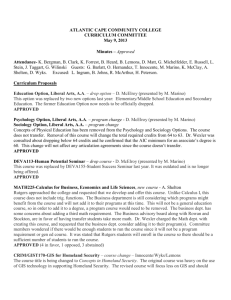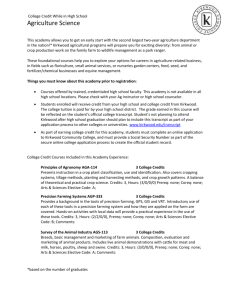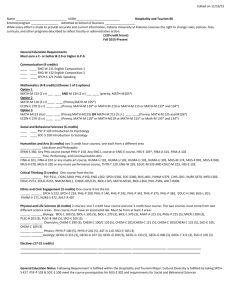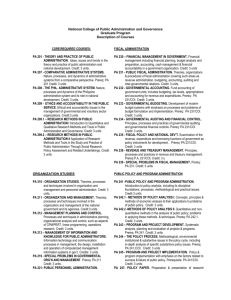Cognitive Science Major, Requirements
advertisement
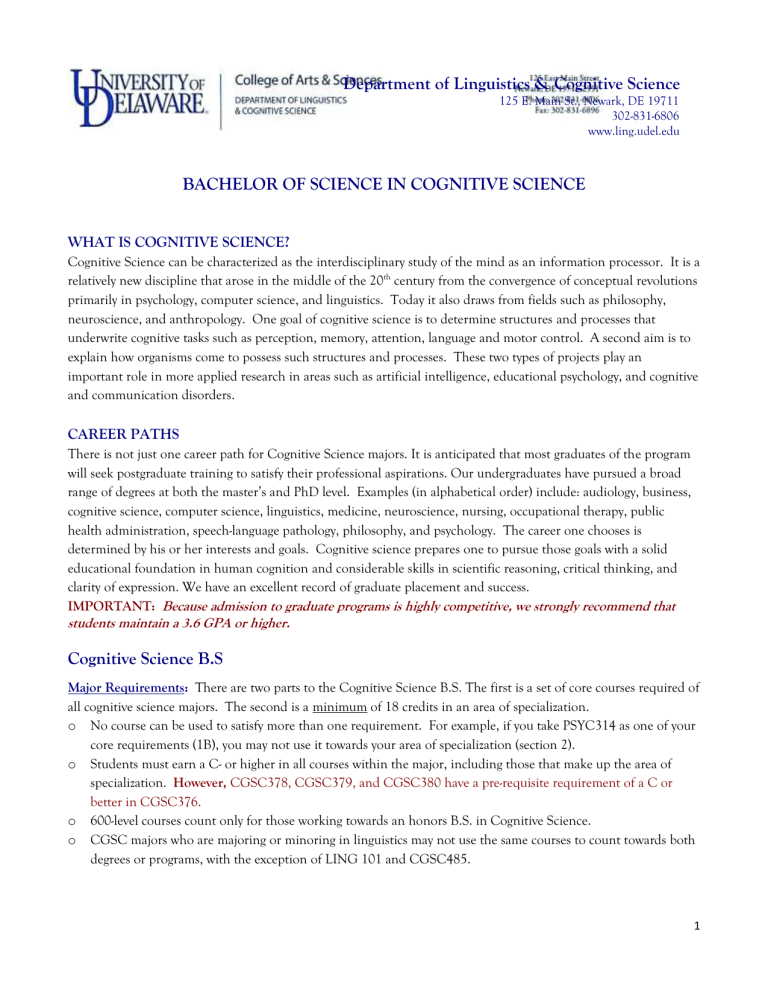
Department of Linguistics & Cognitive Science 125 E. Main St., Newark, DE 19711 302-831-6806 www.ling.udel.edu BACHELOR OF SCIENCE IN COGNITIVE SCIENCE WHAT IS COGNITIVE SCIENCE? Cognitive Science can be characterized as the interdisciplinary study of the mind as an information processor. It is a relatively new discipline that arose in the middle of the 20th century from the convergence of conceptual revolutions primarily in psychology, computer science, and linguistics. Today it also draws from fields such as philosophy, neuroscience, and anthropology. One goal of cognitive science is to determine structures and processes that underwrite cognitive tasks such as perception, memory, attention, language and motor control. A second aim is to explain how organisms come to possess such structures and processes. These two types of projects play an important role in more applied research in areas such as artificial intelligence, educational psychology, and cognitive and communication disorders. CAREER PATHS There is not just one career path for Cognitive Science majors. It is anticipated that most graduates of the program will seek postgraduate training to satisfy their professional aspirations. Our undergraduates have pursued a broad range of degrees at both the master’s and PhD level. Examples (in alphabetical order) include: audiology, business, cognitive science, computer science, linguistics, medicine, neuroscience, nursing, occupational therapy, public health administration, speech-language pathology, philosophy, and psychology. The career one chooses is determined by his or her interests and goals. Cognitive science prepares one to pursue those goals with a solid educational foundation in human cognition and considerable skills in scientific reasoning, critical thinking, and clarity of expression. We have an excellent record of graduate placement and success. IMPORTANT: Because admission to graduate programs is highly competitive, we strongly recommend that students maintain a 3.6 GPA or higher. Cognitive Science B.S Major Requirements: There are two parts to the Cognitive Science B.S. The first is a set of core courses required of all cognitive science majors. The second is a minimum of 18 credits in an area of specialization. o No course can be used to satisfy more than one requirement. For example, if you take PSYC314 as one of your core requirements (1B), you may not use it towards your area of specialization (section 2). o Students must earn a C- or higher in all courses within the major, including those that make up the area of specialization. However, CGSC378, CGSC379, and CGSC380 have a pre-requisite requirement of a C or better in CGSC376. o 600-level courses count only for those working towards an honors B.S. in Cognitive Science. o CGSC majors who are majoring or minoring in linguistics may not use the same courses to count towards both degrees or programs, with the exception of LING 101 and CGSC485. 1 CGSC BS, Core Courses, 25 Credits A. All of the Following, 12 Credits CGSC 170 CGSC 485 LING 101 PSYC 100 Introduction to Cognitive Science Seminar in Cognitive Science Introduction to Linguistics General Psychology Take 1st or 2nd year in major. Take Sr year; satisfies 2nd Writing Requirement Take 1st semester in major. Take in 1st year in major. B. Advanced PSYC/CGSC Course: One of the Following, 3 Credits CGSC 410 CGSC 420 CGSC 451 PSYC 314 PSYC 340 PSYC 350 Embodied Cognition Research Methods in Cognitive Science Topics in Cognitive Science Brain and Behavior Cognition (X-list CGSC 340) Developmental Psychology Pre-req: PSYC209 or STAT200 (or equivalent) Pre-req: PSYC100 Pre-req: PSYC207 & PSYC209 (or STAT200) Pre-req: PSYC207 & PSYC209 (or STAT200) C. Biology Requirement: One of the Following, 4 Credits BISC 104 Principles of Biology with Laboratory BISC 207 Introductory Biology I D. Computational Requirement: One of the Following, 3 Credits CISC 101 Principles of Computing CISC 103 Intro. to Computer Sci. w/Web Apps Acceptable Substitute for CISC 103: CISC 106 CISC 108 General Computer Science LING 202 Science of Language PHIL 205 Logic Coreq: MATH115 or 117 or higher Prereq: LING101 E. Statistics Requirement: One of the Following, 3 Credits MATH 202 Introduction to Statistical Methods 2 MATH 205 Statistical Methods PSYC 209 Measurement and Statistics SOCI 301 Introduction to Sociological Research STAT 200 Basic Statistical Practice Prereq: Prereq: Prereq: Prereq: MATH201 MATH210 or MATH230 PSYC100 SOCI201 and A&S Math Skills Req. Area of Specialization Requirement: 18-27 credits In addition to completing the 25 credit hours of required core courses, students must complete a minimum of 18 additional credit hours in an area of specialization. (Some areas of specialization may exceed 18 hours.) Approved areas of specialization can be found below. Substitute courses may be proposed by the student; written justification for the substitution should be submitted the Director of Undergraduate Studies for the Department of Linguistics and Cognitive Science. As a reminder, no course can count more than once towards the BS in Cognitive Science. That is, you may not use a course that you have counted toward your core courses towards your area of specialization. 2 Area of Specialization Requirement: Select One of the Following Areas Computational, Mathematical, & Logical Foundations of Cognitive Science (18 credits) Students in this area of specialization are strongly encouraged to minor in Computer Science. A. Two of the Following, 6 credits CGSC 455 Computational Linguistics (C/L LING455) CGSC 470 Elements of Cognitive Science LING 404 Structure of Language LING 451 Logical Structures in Language B. All of the Following, 6 credits CISC 181 Intro to Computer Science II 241 or higher CISC 220 Data Structures C. One of the Following, 3 credits CISC 275 Intro to Software Engineering CISC 303 Automata Theory CISC 304 Logic and Programming D. One of the Following, 3 Credits CISC 401 Elements of the Theory of Computation CISC 404 Logic in Computer Science CISC 470 Programming Languages CISC 481 Artificial Intelligence CISC 484 Intro to Machine Learning CISC 489 Topics in Artificial Intelligence Prereq: LING101 Prereq: LING101 Prereq: LING101 Prereq: CISC106 or 108. Coreq: MATH221 or Prereq: CISC181 Prereq: CISC220 Prereq: CISC220 and MATH210 Prereq: CISC220 and MATH210 Prereq: CISC303 Prereq: CISC304 Prereq: CISC275 Prereq: CISC220 and 304 Prereq: CISC220 and MATH205 Prereq: CISC481 Philosophical Foundations of Cognitive Science, 18 Credits Six of the Following, 18 Credits. 15 credits must be at the 300-level or above. CGSC 327 Race, Gender, Science (C/L, PHIL/WOMS/BAMS 327) CGSC 404 Animal Minds (possible C/L, PHIL404) CGSC 410 Embodied Cognition (C/L PHIL 410) CGSC 418 Meaning & Language Use (C/L LING & PHIL 418) Prereq: LING101 CGSC420 Research Methods in Cognitive Science CGSC 421 Philosophy, Biology, Society (C/L PHIL 321) CGSC 450 Recent Topics in Philosophy of Mind (C/L PHIL 450) CGSC 451 Topics in Cognitive Science CGSC 455 Computational Linguistics (C/L LING 455) CGSC 470 Elements of Cognitive Science CGSC 490 Meaning & Reference (C/L PHIL 490) LING 444 First Language Development Prereq: LING101 LING 451 Logical Structures in Language Prereq: LING101 PHIL 211 Basic Decision Theory PHIL 207 Scientific Reasoning PHIL 306 Philosophy of Science PHIL 315 Metaphysics PHIL 320 Theory of Knowledge (C/L CGSC 320) PHIL 330 Philosophy of Mind (C/L CGSC 330) Psychological Foundations of Cognitive Science, 18 credits 3 Students in this area of specialization are strongly encouraged to minor in psychology. Reminder: No course can count twice towards a requirement. For example, if you used a course in your core requirements, you cannot also count it towards your concentration. A. Three of the Following, 9 Credits NSCI 320 NSCI 431 NSCI 433 NSCI 468 PSYC 310 PSYC 312 PSYC 314 PSYC 325 PSYC 334 Intro to Neuroscience (C/L PSYC320) Prereq: Stress and the Brain Prereq: Cognitive Neuroscience (C/L PSYC 433) Prereq: Advanced Research Prereq: Sensation & Perception Prereq: Learning & Motivation Prereq: Brain & Behavior (C/L CGSC314) Prereq: Child Psychology Prereq: Abnormal Psychology Prereq: PSYC100 or NSCI100 NSCI320 PSYC209 NSCI368, NSCI majors & minors only. PSYC207 & 209 PSYC207 & 209 PSYC100 or NSCI100 PSYC100 PSYC100. Credit cannot be received for both 334 & 380 PSYC 340 PSYC 344 PSYC 350 PSYC365 PSYC 380 Cognition (C/L CGSC 340) Psychology of Language Developmental Psychology Psychology Field Placement Psychopathology PSYC 414 PSYC 428 PSYC 431 PSYC 440 PSYC 442 PSYC 445 PSYC 446 PSYC 481 PSYC 491 Drugs in the Brain (C/L NSCI 414) Nature vs Nurture Hormones and Behavior Topics in Psycholinguistics Perception, Memory, and Imagination Topics in Adolescent Psychology Psychology of Music Clinical Psychology Psychology of Temporal Orientation Prereq: Prereq: Prereq: Prereq: Prereq: PSYC207 & 209 PSYC209 PSYC207 & 209 PSYC207 & 209 PSYC100. Credit cannot be received for both 334 & 380 Prereq: PSYC209 Prereq: Prereq: Prereq: Prereq: Prereq: Prereq: Prereq: PSYC100 or NSCI100 & PSYC209 PSYC207 & 209 PSYC207 & 209 PSYC207 & 209 PSYC100 PSYC207 & 209 PSYC207 & 209 B. Three of the Following: 9 Credits, 3 Credits must be at the 300-level or above. ANTH 205 Anthropology & Human Nature (C/L CGSC205) CGSC 327 Race, Gender Science (C/L PHIL, BAMS, WOMS 327) CGSC 404 Animal Minds (possible C/L, PHIL404) CGSC 410 Embodied Cognition CGSC 418 Meaning & Language Use (C/L LING/PHIL 418) CGSC 420 Research Methods in Cognitive Science Pre-Req: CGSC STAT requirement CGSC 451 Topics in Cognitive Science CGSC 455 Computational Linguistics CGSC 490 Meaning & Reference CGSC 496 Psycholinguistics Prereq: LING101 LING 102 Language, Mind, and Society LING 202 Science of Language Prereq; LING101 LING 404 Structure of Language Prereq: LING101 LING 444 First Language Development Prereq: LING101 LING 451 Logical Structures of English Prereq: LING101 LING 462 Language Acquisition Prereq: LING101 LING 480 Sociolinguistics PHIL 320 Theory of Knowledge (C/L CGSC320) PHIL 330 Philosophy of Mind (C/L CGSC330) 4 Science of Language, 18 Credits A. All of the following, 6 Credits LING403 Introduction to Phonology Prereq: LING101 and LING202 LING404 Structure of Language Prereq: LING101 B. One of the following, 3 Credits LING418 Meaning and Language Use Prereq: LING101 CGSC 490 Meaning and Reference C. And 9 credits of LING courses or CGSC courses cross-listed with LING. Pre-Professional Speech-Language Pathology, 27 Credits Grad programs vary in their pre-req. courses they require. You can research pre-requisites through ASHA’s EdFind (asha.org/edfind/) Some courses for the SLP concentration are restricted to CGSC majors. All of the Following, 21 Credits LING 253 CGSC 376 CGSC 378 CGSC 379 CGSC 380 Laboratory Phonetics Introduction to Communication Disorders Anatomy and Physiology of Speech Audiology Clinical Principles & Procedures in SLP* CGSC 433 CGSC 496 Introduction to Acoustic Phonetics Psycholinguistics Prereq: LING101, Requires a laptop computer Prereq: LING101 Prereq: LING101; C or better in CGSC376 Prereq: LING101; C or better in CGSC376 Prereq: LING101; C or better in CGSC376 * Requires transportation for observation hrs Prereq: LING253, Requires a laptop computer Prereq: LING101 One of the Following, 3 Credits LING 403 LING 480 Introduction to Phonology Sociolinguistics Prereq: LING101 and LING202 Prereq: LING101 One of the Following, 3 Credits LING 444 LING 462 First Language Development Lang. Acquisition (C/L EDUC& PSYC462) Prereq: LING101 Prereq: LING101 Recommended Elective Courses: Not Required for Completion of CGSC BS, but Useful for Graduate School Admissions Graduate programs often have a physical science requirement. This can be fulfilled at UD with one of the follow: CHEM 101, CHEM 102, CHEM 103, CHEM 104, CHEM 105, or PHYS 201. Alternatively, a student can take any intro to chemistry or intro to physics course at another institution; no lab required. LING 403, if you did not take it as one of your area of specialization courses. LING 480, if you did not take it as one of your area of specialization courses. ENGL 410: Technical Writing (Prereq: ENGL 110) -- OR -- ENGL 415: Writing in the Professions (Prereq: ENGL 110) HDFS 339: Adult Development and Aging (Prereqs: EDUC 202 or HDFS 201) -- OR -- HDFS 405: Aging & the Family CGSC310: Orientation o Clinical Experiences. This is a hands on course that offers guided observation hours Work in a lab for independent study credit. Here are some instructions for finding placement in a lab. 1. Read about the research being done in various labs on campus by visiting faculty web sites in relevant department such as Psychology, Linguistics & Cognitive, and Physical Therapy. 2. Contact several professors to ask if s/he has space for you to work in his or her lab for credit during the term of interest (fall, winter, summer, or spring). 3. Once you receive positive replies, pick a lab and sign up for an independent studies class with the professor under his or her home department. The number of credits will vary depending on the number of hours worked. 5
